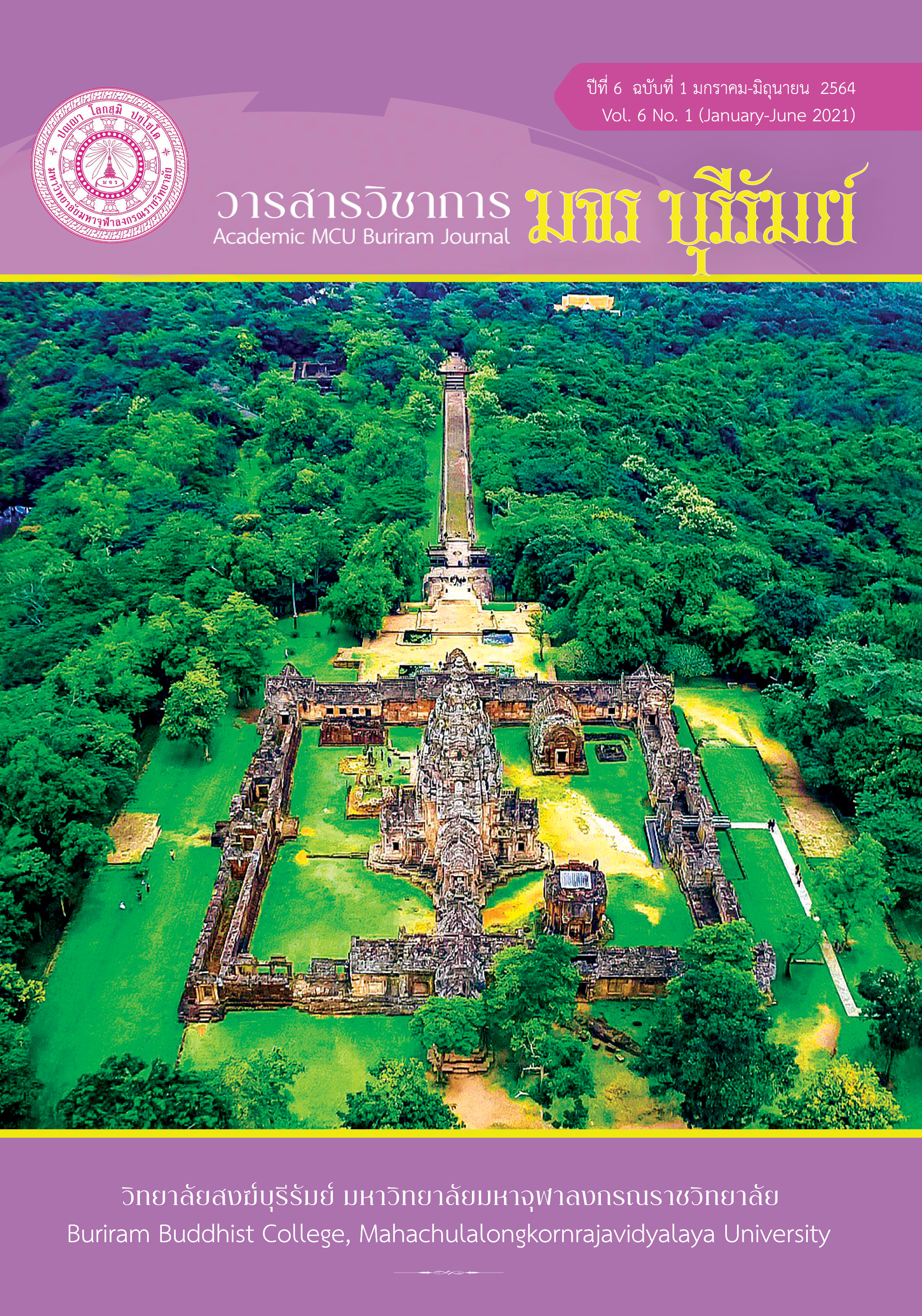The Operational Guidelines according to the Six Missions of the Sangha in Nakhon Ratchasima Province
Keywords:
Operational Guidelines, Mission, The SanghaAbstract
This research article has objectives: 1) to study the implementation of the six missions of the Sangha in Nakhon Ratchasima Province, 2) to study the conditions, problems in the implementation of the six mission of the Sangha in Nakhon Ratchasima Province and 3) to propose operational guidelines in accordance with the six missions of the Sangha in Nakhon Ratchasima by being in the field in an interview and organized a group discussion of 86 person (monks and seculars) in the Nakhon Ratchasima area to collect data for analysis and synthesis.
The research result finds that:
The implementation of the six missions of the Sangha in Nakhon Ratchasima Province including (1) on governance, there are meetings at all levels for the orderliness of the clergy, (2) on religious education, there is a promotion of learning and teaching’s management for both the monks and the householder, (3) on religious propagation, there are activities to visit the area to demonstrate the Dhamma and providing knowledge to the community, (4) on public utilities, there are improvements, repairs, assistance to temples, houses and schools whose are experiencing difficulties, (5) on aid education, there is a support to promote the capital, educational materials, both practice and rejection and (6) on public welfare, there is a religious practice activity project for the monks and the laity.
The state of the operational problems of the monks in Nakhon Ratchasima in the six aspects of social work development : (1) on governance, there are the monks did not attend the meeting and did not follow the resolution of the meeting, (2) on religious education, there are novices and monks do not attend education and had not been ordained for a long time, (3) on religious propagation, there are some communities did not cooperate and had few participants, (4) on public utilities, there are problems of system in the administration of religious places and objects that need to be heavily budgeted, (5) on aid education, there is a lack of funds and educational equipment and (6) on public welfare, there is not cooperating, lack of empathy Inadvertently and not put into practice.
The guidelines for the implementation of the six missions of the Sangha in Nakhon Ratchasima Province are in six forms, namely (1) on governance, it should be adhere to the principles of conditions of welfare, Dharma and disciplines, unity of Sangha and respect, (2) on religious education, it should be based on the principles of 5 powers (Bala), gratitude and the preservation of the true Dhamma (Saddhamma), (3) on religious propagation, it should adhere to the principle of 4 objects of symphaty (Sangahavatthu) in order to build a good relationship, to promote of the missionary work and building faith, (4) on public utilities it should adhere to the principle of 7 virtue of the righteous (Sappurisadhama), to develop of management, guidelines for promoting, improving, repairing, (5) on aid education, it should adhere to 6 states of conciliation (Saraniyadhamma), learning and teaching management, to promotion of learners and relationship building and (6) on public welfare, it should adhere to the threefold training principle (Tisikkha), morality, quality of life and the well being in good condition.
References
กรมการศาสนา.(2538). คู่มือการบริหารศึกษาคณะสงฆ์.กรุงเทพมหานคร: โรงพิมพ์ กรมการศาสนา.
กวี วงศ์พุฒ. (2539). ภาวะผู้นำ. พิมพ์ครั้งที่ 4.กรุงเทพมหานคร: ศูนย์ส่งเสริมวิชาชีพบัญชี.
พระพรหมคุณาภรณ์ (ป.อ. ปยุตฺโต). (2550). ธรรมนูญชีวิต. กรุงเทพมหานคร: สำนักพิมพ์จันทร์เพ็ญ.
พระพรหมคุณาภรณ์ (ป.อ. ปยุตฺโต). (2543). ทศวรรษธรรมทัศน์พระธรรมปิฎก หมวดศึกษาศาสตร์. กรุงเทพมหานคร: ธรรมสภา.
มหาจุฬาลงกรณราชวิทยาลัย. (2539). พระไตรปิฎกภาษาไทย ฉบับมหาจุฬาลงกรณวิทยาลัย. กรุงเทพมหานคร: โรงพิมพ์มหาจุฬาลงกรณราชวิทยาลัย.
วัชระ งามจิตรเจริญ. (2554). สมการความว่าง. นนทบุรี: สำนักพิมพ์กรีนปัญญาญาณ.
สัญญา สัญญาวิวัฒน์. (2544). ทฤษฏีองค์กรประสิทธิภาพ รวมบทความสังคมวิทยาและมานุษยวิทยา. กรุงเทพมหานคร: โรงพิมพ์จุฬาลงกรณมหาวิทยาลัย.
พระครูโอภาสธรรมพิทักษ์ (เสียม เตชธมฺโม/เงางาม). (2554). ศึกษาหลักและวิธีการเผยแผ่ธรรมของพระธรรมโมลี (ทองอยู่ ญาณวิสุทฺโธ). วิทยานิพนธ์พุทธศาสตรมหาบัณฑิต. บัณฑิตวิทยาลัย: มหาวิทยาลัยมหาจุฬาลงกรณราชวิทยาลัย.
พินิจ ลาภธนานนท์. (2549). กระบวนการเปลี่ยนแปลงทางสังคมกับการปรับเปลี่ยนบทบาทการพัฒนาของพระสงฆ์ นักพัฒนาในภาคอีสาน. รายงานการวิจัย. บัณฑิตวิทยาลัย: จุฬาลงกรณ์มหาวิทยาลัย.
สิรภพ สวนดง. (2563). ความเชื่อพระพุทธศาสนาในปราสาทหินพิมาย. รายงานการสืบเนื่องประชุมวิชาการ การประชุมวิชาการระดับชาติ ครั้งที่ 1. มจร วิทยาเขตสุรินทร์.
เกรียงไกร พินยารักษ์. (3 พฤษภาคม 2563). อาจารย์ประจำมหาวิทยาลัยมหาจุฬาลงกรณราชวิทยาลัย วิทยาเขตนครราชสีมา. สัมภาษณ์.
ธวัศชา เดชสุภา. (18 กุมภาพันธ์ 2563). อาจารย์ประจำมหาวิทยาลัยชินวัตร. สัมภาษณ์.
น.ท.จวน ทรงภูมิ. (11 พฤษภาคม 2563). ผู้จัดการโรงเรียนอนุบาลวัดสะแกและไวยาวัจกรวัดสะแก. สัมภาษณ์.
พ.ท.แดนชัย แก้วสา. (3 พฤษภาคม 2563). 6 หัวหน้าแผนกกรรมวิธีข้อมูล กองทัพน้อยที่ 2 ตำบลในเมือง อำเภอเมืองนครราชสีมา จังหวัดนครราชสีมา. สัมภาษณ์.
พระครูศรีปริยัติวิสุทธิ์ อภิปุญฺโญ. (10 กุมภาพันธ์ 2563). รองเจ้าคณะจังหวัดนครราชสีมาและเจ้าอาวาสวัดด่านใน. สัมภาษณ์.
พระครูศีลวราภรณ์ ฐิติสีโล. (13 กุมภาพันธ์ 2563). เจ้าอาวาสวัดโนนเมืองและผู้อำนวยการ
โรงเรียนมัธยมพุทธเกษตร. สัมภาษณ์.
พระครูอุดมเขมคุณ ฐานุตฺตโร. (23 กุมภาพันธ์ 2563). เจ้าคณะอำเภอพระทองคำและเจ้าอาวาสวัดพังเทียม. สัมภาษณ์.
พระเทพสีมาภรณ์ กนฺตจารี. (1 กุมภาพันธ์ 2563). เจ้าคณะจังหวัดนครราชสีมาและเจ้าอาวาสวัดบึง (พระอารามหลวง). สัมภาษณ์.
พระภาวนาพัฒนานุสิฐ สมโย (สมัย). (1 พฤษภาคม. 2563). ที่ปรึกษาเจ้าคณะภาค 11 และเจ้าอาวาสวัดคลองตาลอง. สัมภาษณ์.
Downloads
Published
How to Cite
Issue
Section
License
ทัศนะและความคิดเห็นที่ปรากฏในบทความวารสารฉบับนี้ถือเป็นความรับผิดชอบของผู้เขียนบทความนั้น ไม่ถือเป็นทัศนะและความรับผิดชอบของบรรณาธิการ





